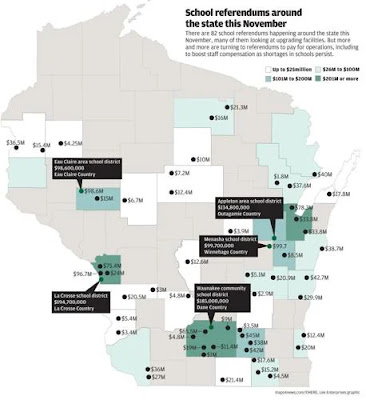The biggest line-item in any Wisconsin budget comes from aid to K-12 schools, and that's especially true with a former public school teacher as the state's governor. With $7 billion in the bank, Evers wants to go big on K-12 education over the next 2 years,
and Wispolitics summarizes the biggest parts of Evers’ K-12 plans.
*$1 billion more over the biennium distributed to schools through the general equalization aid formula.
*$1 billion more over the biennium for special education. The money, in addition to what was approved in the current budget, would mean the state reimbursing 60 percent of special education costs in both years of the biennium. In the fall, Evers and Underly called for $750 million more for special ed.
*increasing the per-pupil revenue limit by $350 in the first year of the budget and $650 in the second. Evers said that would be the largest adjustment since revenue limits were imposed.
The last part is a big deal, as these are the revenue limits based on
general aids + property taxes , and those base revenue limits are lower now than they were 13 years ago.
Act 10’s “tools” to control costs (by screwing over teachers and staff) were used up a d ecade ago, while schools have had to figure out other ways to deal with the increased costs in the real world since then. This helps explain the continuing series of school referenda that Wisconsin voters have had to deal with since then in order to help pay for those costs as well as the need to update infrastructure,
including more than $1.9 billion last November.
Increasing the overall revenue limits by $350 per pupil next year and $650 in 2024-25 would make it easier for schools to make ends meet, and the $1 billion in general aids should reduce the reliance on property taxes to fund public schools. The $1 billion increase in special education aids also will allow for schools to use more of those “general” funds instead of having to use it to pay for their special ed services.
WisPolitics also notes that Evers is calling for a boost in the one type of public school aids the WisGOPs have been willing to fund in the post-Act 10 era.
Republicans under Walker created a separate categorical aid in the 2011-13 budget. That money was divided up per pupil, regardless of a district’s wealth. Those payments began at $50 in 2012-13 and increased to $742 in the 2019-20 school year. It hasn’t been increased since with Republicans arguing districts should rely on federal COVID-19 money for spending increases.
Evers’ budget would increase those payments by $46.5 million over the biennium, an increase of $24 per student in 2023-24 and $45 in 2024-25.
This comes outside of the revenue limits, so this will boost resources that can be used. And it’s going to be needed, since COVID funds can’t be set aside for funding after September 2024, and many districts have likely already used up what they got, due to the constraints put on them in recent years.
Evers is hoping to cap enrollment in voucher and charter schools at 2024’s levels for future years (seems unlikely that a WisGOP Legislature that gets a lot of Dirty DeVos Dollars would go for that). But his budget also will give a funding boost for those types of schools to go along with the increase that public K-12 schools would get.
*increases of $374 per pupil in 2023-24 and another $695 in 2024-25 for independent charter schools and schools participating in a parental choice or special needs scholarship program;
Which means many more millions to private schools that have already seen a significant boost in state tax dollars over the last 12 years, with those payments doubling since 2015, and increasing amounts of funds being taken away from the home districts of voucher students.
I would have liked to see Evers fix this funding flaw in the voucher system, and stop the aid reduction to public schools that often have not ever had those students attend a class in their district. With a huge surplus, we have the extra funds available to afford it, and lawmakers and the public should have to face the consequence of fully funding two systems of K-12 education, and do it through state taxes, and not the property taxes that are often levied in communities to make up for the voucher funding flaw.
One last item will give $120.2 million to fund school breakfasts and lunches for all students starting in 2024-25. This would restore the free meals was put in schools during in the COVID era,
takes away from stigma and/or hunger that results from only allowing assistance for the poorest children, and can fill in the needs that are coming from
the reduction of SNAP benefits that hits at the end of this month.
As usual, I don’t count on all (or all that much) of the $2.6 billion increase in Evers’ request for K-12 to get through the GOP Legislature. But there is a definite need to boost revenue limits and to reduce the need to use property taxes, and there is generational chance to change how we fund our public, community schools. Wisconsin needs to use that opportunity to regain our competitiveness, and the high-level schools and quality of life that we used to hang our hat on.


No comments:
Post a Comment